
Dosa Recipe:
Dosa is an iconic South Indian dish that’s loved around the world. This thin, crisp, and savory pancake is traditionally made from fermented rice and urad dal (black gram), and it is typically enjoyed with coconut chutney and vegetable sambar. Dosa has earned its reputation not only for its delightful taste but also for its nutritional value and versatility. Whether you’re making a simple plain dosa or a crispy paper dosa, this dish can be enjoyed by people of all ages.
In this detailed guide, we’ll walk you through the process of making the perfect dosa from scratch, including tips to ensure your dosa batter turns out just right and doesn’t stick to the pan. You’ll also learn about the variations of dosa that you can try and the essential tips for perfecting your dosa-making skills.
Preparation Time: 14 hours
Cooking Time: 25 minutes
Serves: 4 servings
| Ingredients: |
| 3/4 cup Parboiled Rice (idli-dosa rice) |
| 3/4 cup Normal Rice |
| 1/2 cup Entirety Urad Dal (without skin) or Part Urad Dal (black lentils) |
| 1/4 teaspoon Fenugreek Seeds (methi dana) |
| 1/2 tablespoon Chana Dal (gram lentils), optional |
| Water, as needed |
| Salt to taste |
| Oil, for shallow frying |
Directions:
1. Prepare Ingredients for the Batter:
To start making the perfect dosa batter, you need a few key ingredients. These include two types of rice—parboiled rice and regular rice—and urad dal, the main component that makes the dosa crispy and fluffy. Fenugreek seeds are added for fermentation, while chana dal can be included to give the dosa a beautiful golden color. Gather all the ingredients, and you’re ready to begin!
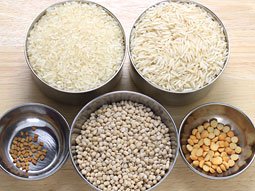
2. Rinse and Soak the Rice:
Start by washing both types of rice (parboiled and regular rice). Rub the rice between your hands and rinse it 3-4 times until the water runs clear. Soak the rice in about 2 cups of water for 4-5 hours. This step will help soften the rice, making it easier to grind later.
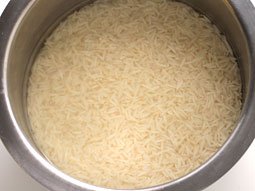
3. Soak the Lentils and Fenugreek Seeds:
Now, wash the urad dal and chana dal (if using) thoroughly. Add fenugreek seeds to the lentils and soak them in 1 cup of water for 4-5 hours. The fenugreek seeds help with fermentation, making the batter rise and creating that signature texture for your dosas.
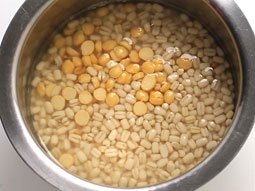
4. Drain and Grind the Urad Dal:
After soaking, drain the water from the urad dal and chana dal mixture, but don’t discard it just yet—it will be useful for grinding. Transfer the soaked lentils and fenugreek seeds into a blender or food processor. Add the saved water in small amounts to achieve a smooth, fluffy texture. It should take about 5-10 minutes to grind the dal into a soft batter. Transfer this batter into a large mixing bowl.
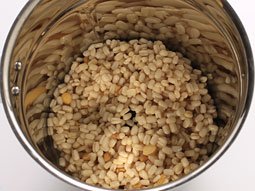
5. Grind the Rice:
Next, drain the water from the rice and transfer it to the blender or food processor. If necessary, grind the rice in batches depending on the size of your blender. Add small amounts of water as you grind. The rice batter should have a slightly grainy texture, which is perfect for making dosa. Once the rice is ground, mix it together with the urad dal batter in the large bowl.
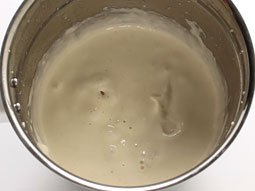
6. Mix the Batters Together:
Now that both the rice and dal are ground, it’s time to combine them. Add salt to taste and mix the batters thoroughly using a spoon or your hands until they are well incorporated. The consistency of the batter should be smooth and slightly flowing, but not too runny. You want it to be slightly thicker than pancake batter, so be mindful of the water you add.
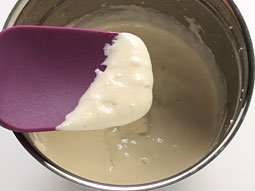
7. Ferment the Batter:
Cover the batter with a plate or clean kitchen towel and leave it to ferment in a warm place for 8-10 hours or overnight. In warmer climates, it will ferment within 6-8 hours, while in colder climates, it may take 12-14 hours. The batter should rise and form bubbles when stirred. This is the magic of fermentation that makes your dosa soft, airy, and full of flavor.
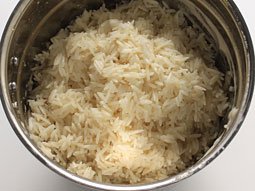
8. Check the Fermentation Process:
After fermentation, check the consistency of the batter. If it has thickened too much, add a little water and stir until it reaches a pouring consistency. It should be slightly thinner than idli batter, but not too watery. The batter should be slightly bubbly, and the volume will have increased during the fermentation process.
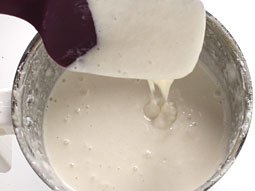
9. Preheat the Griddle (Tava):
Once your batter is ready, it’s time to cook the dosa! Heat a non-stick or cast iron griddle (tava) over medium heat. To check if the griddle is hot enough, sprinkle a few drops of water onto the surface. If the water sizzles and evaporates almost immediately, your griddle is ready for dosa-making.
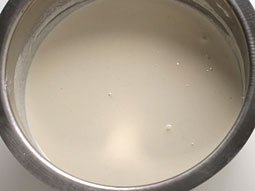
10. Grease the Griddle:
Lightly grease the hot griddle with a teaspoon of oil using a spatula or a damp cloth. This prevents the dosa from sticking to the surface while also helping it become crispy and golden. Be sure to spread the oil evenly on the griddle.
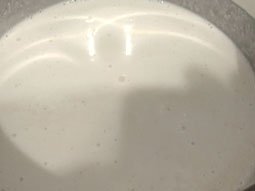
11. Spread the Dosa Batter:
Now, take a ladle full of the batter and pour it in the center of the griddle. Using the back of the ladle, spread the batter outward in a circular motion to form a thin, even layer. If you want a larger dosa, you can spread the batter further, but keep it as thin as possible for the best texture.
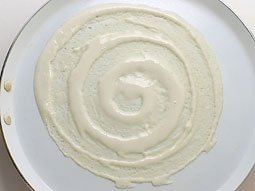
12. Cook the Dosa:
Once the batter is spread evenly, drizzle a teaspoon of oil (or ghee, if you prefer a richer flavor) around the edges of the dosa. Let it cook for about 2 minutes, or until the edges turn golden brown and begin to lift off the griddle. You’ll notice the surface becoming crispy and slightly bubbly. If you’re making a plain dosa, you can leave it to cook only on one side, or if you prefer a thicker dosa, flip it over to cook the other side for a few seconds.

13. Serve the Dosa:
Once the dosa is crispy and golden, transfer it to a plate. You can fold it in half or serve it as a whole depending on your preference. Serve hot with coconut chutney and vegetable sambar for a classic South Indian meal. If you are making more dosas, remember to wipe the griddle with a clean, damp cloth before spreading the batter again. This will help prevent the dosa from sticking.
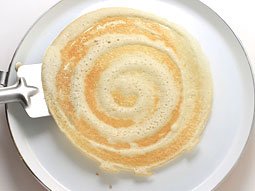
14. Repeat the Process:
Continue making dosas with the remaining batter. Each dosa should be crisp and golden, with the perfect balance of texture. Wipe the griddle in between each dosa to prevent sticking and ensure that each dosa comes out perfectly. Once all your dosas are cooked, enjoy them with your favorite accompaniments!
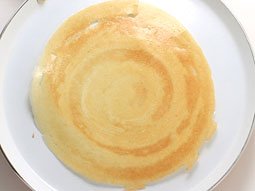
Tips for Perfect Dosa:
- Water Proportions: Rice requires less water than urad dal when grinding. Be cautious and add water in small amounts to achieve the right consistency.
- Fermentation: The fermentation process is crucial for the perfect dosa. Ensure that the batter is not too warm while grinding, as this can prevent proper fermentation.
- Griddle Temperature: To prevent dosa from sticking, make sure the griddle is at the right temperature before spreading the batter. A well-heated griddle is essential for crispy dosas.
- Keep It Thin: If you prefer a paper-thin dosa, make sure to spread the batter thinly on the griddle, and don’t overcook it on one side.
- Greasing the Griddle: Always grease the griddle lightly with oil or ghee to get that perfect crisp texture and golden color.
Variations of Dosa:
- Mysore Masala Dosa: Add a spicy red chutney or potato filling to your dosa for a flavorful twist.
- Set Dosa: A thicker, fluffier version of dosa, usually served with coconut chutney and sambar in sets of two or three.
- Ragi Dosa: Substitute half of the rice with ragi flour for a healthier, gluten-free alternative.
- Wheat Flour Dosa: Use whole wheat flour instead of rice for a different texture and a healthier option.
- Paper Dosa: Spread the batter thinner and cook it for a longer period to achieve a crispy, paper-thin texture.
- Uttapam: Use the same dosa batter but make it thicker and top it with finely chopped vegetables like onions, tomatoes, and chilies for a delicious variation.
Taste: Crispy and Savory
Serving Ideas: Serve paper dosa with white coconut chutney and vegetable sambar in the breakfast or in supper. It can be too served with red coconut chutney and green coconut chutney.
